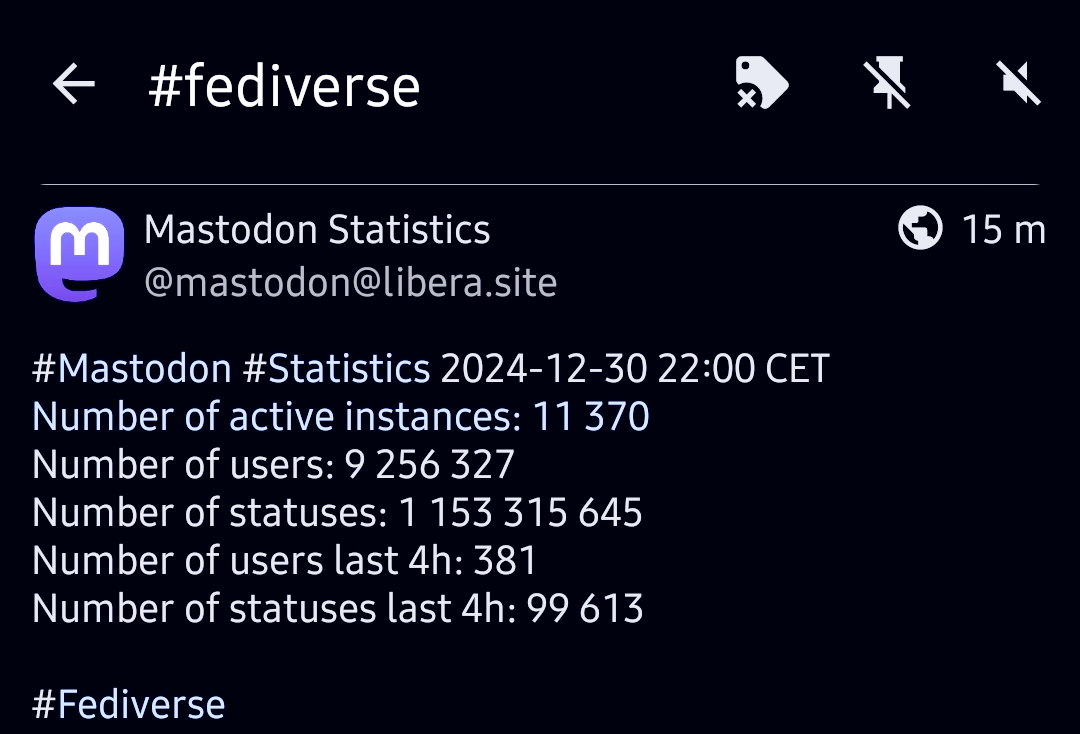On 2024-09-23 I read that another Mastodon instance is calling it quits. StrangeObject.Space will shut down at the end of the year. You can read their post at https://blog.strangeobject.space/posts/2024-09-23-shutting-down.html
This follows the announcement five days before by Mozilla.Social that they would shut down by the end of the year. Other instances large and small have also gone by the wayside, mstdn.lol for example left a lot of users scrambling for a new home.
This has led many to question whether Mastodon is sustainable. Does it have a future?
Mastodon’s Problems
Moderation. While not the first thing that likely comes to mind, the most common issue I’ve seen with instances that have decided to call it quits is the stress on the moderators.
Any large random selection of humans is going to have a large number of reasonably decent people, a very small selection of saints, and a small but very loud number of assholes. And the assholes come in every flavor from trolls to perpetual victims of imaginary crimes. And those are the ones that make it rough on the volunteer staff of any Mastodon instance.
Even paid moderators on commercial social media sites like Facebook and Twitter have a high burnout rate. Many of them, sadly endure it because they have no other economic choice. ( See this opinion piece on the Washington Post for an illustration of the situation. Go to this archived version if you can’t get past a paywall).

User Apathy. Perhaps apathy is too strong a word. Passivity may be more accurate. The bulk of users have grown up with centralized social media that gives the illusion that all costs are born by some faceless company who for no reason at all provides a platform on which they can post pictures of their breakfast or indulge in their latest conspiracy. Twitter, Facebook, Instagram, et al have trained users to feel that social media is their birthright, and it’s provided by some benevolent overlord that asks nothing of them.

Finances
It takes money to run a server. Instance admins should not have to pay out of pocket to keep an instance going. Many do. But that can’t last. The admin of mstdn.social , @stux made multiple requests for help this last month and still had to pay hundreds of euros out of his own pocket. That’s not fair. That’s not sustainable.
What are the Solutions
Every Mastodon user needs to become invested in their instance in particular, and in Mastodon as a protocol.
Every user needs to be familiar with their instances server rules and code of conduct, and ought to help enforce it.
At an absolute minimum, users who see abusive behavior in a toot should report it. The flip side of that being that users should refrain from reporting everything with which they disagree.
Anyone with the time should be ready to serve as a moderator part-time, whether that means being a moderator one day a month, once a week, several hours a month, or being assigned moderation for every “x” number of incidents.
Admins
Admins need to learn to share responsibilities. I get it. Someone who has the motivation to start an instance wants to see it done right. But it is in the best interest of the Mastodon and the Fediverse as a whole to have more administrators. Admin founders should recruit and train co-administrators to share the load, learn, and perhaps some day start a new instance. An admin who cannot share the duties with other trusted individuals is much more likely to burn out and walk away.
User training
We need to train Mastodon users to realize their responsibilities, and the limitations of the admins and moderators. As part of the onboarding of new users, periodic reminders and tips should be shown to users of an instance to ensure they are aware of the instances policies and procedures, and the part they play in ensuring the instances success and viability.
Financial Support
There are several financial model that can be implemented. Some are more ethical than others.
Corporate ownership. For this I’ll use the example of Mozilla.Social. They ran their own instance and Mozilla paid for everything. To the users, it seemed free. But the problem with corporate or even individual ownership is that you’re at the mercy of the whims of the owner. Mozilla decided to take their ball and go home. A little more than three hundred users now have to migrate.
Returning to the example of mstdn.social. Stux seems to me much more committed to keeping that instance alive. That instance has twenty thousand users. 20,000. Think of that. If each user on that instance paid just one euro each month, it would pay all the bills with enough left over to provide a little extra for Stux and the moderator team.
There are a few instances I know of that have mandatory financial contributions. 500.Social was set up by Kev Quirk, the same person who started Fosstodon.org. But 500.Social requires a $2/month for membership. Minimal. But there’s more to a financial buy-in than just the money. When you contribute to an instance, you’re also buying into it psychologically. That’s your home. You take care of it.

Social.Coop is another instance that requires a buy-in. In their case, the price of admission is £1 GBP / month.

There are likely more. If you know of an instance that requires a paid membership, please let us know in the comments.
Beyond merely keeping the lights on, requiring a monetary contribution also discourages trolls, who can otherwise spin up account after account on the free instances ad nauseam.
One more entity we all need to support- Mastodon itself. Whatever else you think of Eugen Rochko, we owe him and his team a debt for bringing us Mastodon. And we ought to support that team financially. It’s the right thing to do.
Conclusion
Mastodon’s future is up to us. If it fails, it’s our fault. Us. The users. You. Me. Us.
Breaking away from Facebook, Twitter, Instagram, etcetera is a revolution. Mastodon is a revolution. And a revolution requires sacrifice. Everyone rows the boat. No passengers. No barnacles.
Why is there bluesky, why are they not on the same platform as mastodon
Thank you for your excellent article.
Very nice that you have dealt with ‘Mastodon’ in this way.
You use the blog of ‘Vivaldiserve’, also very nice. 😃 😉
Just read your blog .
I’ll see if I can find you in the Vivaldi forum and on ‘Vivaldi Mastodon’, social.vivaldi.net.
To like you. 😃😄 😉
MASTON gonna live cuz decentralized,
more foss than big whales🐳🐳🐳 like X, meta,
they lead social sites…
but stillb i prefere more mastodons/matrix etc…
according from this statd at end ’24 mastodns keeps growing:
